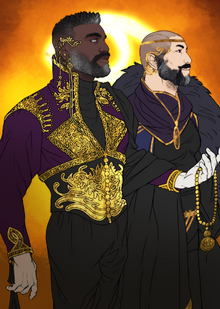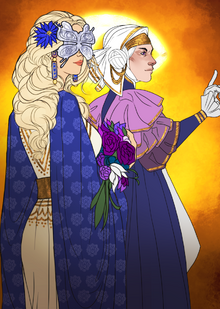More actions
No edit summary |
|||
| (104 intermediate revisions by 6 users not shown) | |||
| Line 3: | Line 3: | ||
|pronunciation = Yoon-yen-is-m | |pronunciation = Yoon-yen-is-m | ||
|origins = Emperor [[Theomar]] | |origins = Emperor [[Theomar]] | ||
|deities = | |deities = The Everwatcher and various other Gods and Goddesses | ||
The Everwatcher | |||
|subsects = | |subsects = | ||
* The Evintarian Cult | |||
* The Guided Cult | |||
* The Armageddon Cult | |||
|}} | |}} | ||
==Origins== | ==Origins== | ||
Unionism as a [[Religion]] was created in the year 5 AC when Emperor [[Theomar]] (the founding [[Regalian Emperor]]) proclaimed the Creed (the holy Scripture) as visions received from the Everwatcher. In the beginnings of the Empire, the faith was slow to spread, but through providence and divine intervention, as well as [[Regalia]]'s military spread and aggressive missionary proselytizing, Unionism quickly spread from its small cult-like origins to a world-religion. It has over the years also absorbed Gods from smaller religions, and included Gods form other Religions to become a very all-inclusive cosmopolitan Religion. While most other Religions are [[Race]] specific with some caveats, Unionism is a cross-Race religion that invites all Races to join under the Everwatcher. | |||
===Schisms=== | ===Schisms=== | ||
Unionism has | Unionism has had a series of schisms in the past centuries, notably the Evintarian schism which was the result of dogmatic differences and a civil war, and the Supremoclast schism which followed a more critical and humanist conscience of the people. This resulted in the Religion splitting in three (with some smaller cults that were later re-absorbed) that engaged in some degree of religious war on each other to proclaim supremacy over the concept of the Everwatcher. It took several centuries, but in recent times, the conflict wounds healed, and the priests of all Schisms came together to re-merge the religious communities, founding the Unionist Divine, which represents the current faith and priesthood. Some Cults like the Evintarian and Guided Cult still exist, however these add optional additional Gods, rather than radically diverging from religious beliefs. | ||
== | ==Core Beliefs== | ||
Unionism is a polytheistic Religion with one single superior being and his mortal vessel on earth, and a whole host of paired Gods who all offer specific lessons of the faith. The Religion's primary objective is world domination, that is to say, to create a globe-spanning Regalian Empire that can create eternal peace and stability, and bring about paradise by banishing war and suffering and death, and bring back all the dead from the Afterlives into an eternal paradise. Each of the God Pairs (except the Vessel) provides what the Unionists call, a Golden Lesson, which acts like a virtue, and opposes a sin in the belief of Unionism. If a person dies and their soul is judged by the Everwatcher they are found to be virtuous, they join the Everwatcher on the Great Stairway where they watch down on the living in wait for paradise to come. If they are deemed sinful, they are re-incarnated in the mortal world, so they are given another chance. The following Golden Lessons can be found in Unionism: | |||
* ''' | * '''Theomar and Thedmir:''' The Golden Lesson preaches that Unionism is good, and that spreading the faith is a virtue, and that sin is turning away from the Great Way, or outright sabotaging its intent. | ||
* ''' | * '''Ness and Eora:''' The Golden Lesson preaches that kindness and compassion are good things, and that even the most criminal seek love and affection and are deserving, while sin is to be bereft of mercy. | ||
* ''' | * '''Juvin and Glanzia:''' The Golden Lesson preaches that virtue is with the pure soul not tainted by the corrupt powers, and with knowing pure fact from wrong, while sin is spreading corruption and false information. | ||
* ''' | * '''Allest and Brand:''' The Golden Lesson preaches that loyalty to the state, the army, and fellow believers is a virtue, as is physical strength, and that sin is treason, deceptiveness without morals, and adultery. | ||
* ''' | * '''Elia and Leona:''' The Golden Lesson preaches that responsibility and protecting society is shared by everyone, no one can be excused, and that sin is to indifferent and not watching for the dangers of the world. | ||
* ''' | * '''Neal and Nolven:''' The Golden Lesson preaches that culture and art fill the soul with light, and that even in the darkness of war is beauty, and that sin is pure blind hatred without grace or beauty. | ||
* ''' | * '''Al-Asir and Marani:''' The Golden Lesson preaches that Technology brings forth great progress, and to share with society is a virtue, and that sin the creation of killing machines that automate death. | ||
* '''Tanthor and Dari:''' The Golden Lesson preaches that even the most wretched, unwanted, and outcast of society have a role in the Great Way, and that sin is to find sadism and satisfaction in hurting the unloved. | |||
* '''Mendes and Hor:''' The Golden Lesson preaches that wealth is there to be shared, but ultimately needed for the greatness of the faith, and that sin is to hoard wealth alone, and to steal from others. | |||
* '''Sinnavei and Eirlys:''' The Golden Lesson preaches that even those outside the Faith can have an indispensable role to fill in paradise, and that sin is the wanton destruction of all that is alien and unknown. | |||
* '''Caan and Kaldric:''' The Golden Lesson preaches that Magic and the Occult are a tainted burden that come with great responsibility, and that virtue can be found in good use, and sin in selfish destructiveness. | |||
===Divine Mechanics=== | |||
All Religions provide 1 single Mechanic to their Believers that fits within the flair of their Religion. This Mechanic is lost if the individual stops believing in the Religion, or becomes a heretic, but can be regained. Afflicted can use this mechanic, but having the mechanic does not imply that they have blanket forgiveness from their Gods, just that there is more nuance to it than that. | |||
* Unionist Faithful can be blessed by the gods by having a divine intervention and being cured of their Affliction or being cleansed of their Affinity through a divine event. Such a divine event should be orchestrated by the player themselves, does not necessarily require a pre-condition like "this character destroyed a Unionist Temple so the Gods intervened" or "this Character tore apart a painting of the Emperor so the Gods punished them", but can require one. This should generally only occur once per Affliction/Affinity, and is entirely up to the player's own consent over their character when and where it occurs. | |||
== | ==Gods and Goddesses== | ||
Unionism | Unionism differs from other Religions, in that it has Duo-Gods. All Duo-Gods are divine and each have divine powers in the afterlife (though some Gods may be yet living). Unionists worship all Gods equally, though they may choose specific Patron gods which they worship more. The Everwatcher acts like an overarching God of Gods, but the Everwatcher cannot directly be interacted with, so most people end up praising the Everwatcher through the Gods and Goddesses. Unionism also has the Cults further below. Cults add Gods onto the standard Pantheon, but they are not mandatory for vanilla Unionists who don't worship the Cults. It is possible to be a believer of both Cults. | ||
<table style="width: 100%;"><tr><td style="width: 50%; vertical-align: top; text-align: left;"> | |||
<span style="font-size:150%;><center>'''Prophet Gods Theomar and Thedmir'''</center></span> | |||
{| | |||
[[File:Thomur.png|220px|caption|left]] | |||
| | |||
* '''Name:''' Theomar (left) and Thedmir (right), the Prophet Gods, first believers. | |||
* ''' | * '''Patron:''' Fathers, Rulers, Nobles, Leaders, Commanders, and Best Friends. | ||
* ''' | * '''Symbols:''' Theomar and Thedmir are symbolized by the necklace of friendship. | ||
* ''' | * '''Role:''' Theomar and Thedmir were the Prophets of Unionism, spreading the faith. | ||
* ''' | * '''Traits:''' Patriarchy, Insight, Good Governance, Loyalty, Friendship, Faith. | ||
* ''' | * '''Temple:''' The All-Beacon Temple in Regalia proper, the largest Unionist Temple. | ||
* ''' | * '''Allies:''' Regulus Worshipers, Dáuw Worshipers, anyone in the military. | ||
* ''' | * '''Enemies:''' In essence all Evolist worshipers, and all Vola Fornoss Gods. | ||
* ''' | * '''Rituals:''' Theomar and Thedmir Rituals involve re-enacting the struggles of them in the early days of Unionism. This involves preaching the faith to non believers, aiding the faithful in the defense of their holy shrines and places of worship, to mediate and act as diplomat for embattled groups, and to provide spiritual guidance to the Military. Theomar and Thedmir also have rituals concerning the sanctification and re-affirmation of friendship. | ||
* ''' | |} | ||
= | </td><td style="vertical-align: top; width: 50%;"> | ||
= | <span style="font-size:150%;><center>'''Mother Gods Ness and Eora'''</center></span> | ||
{| | |||
[[File:Ness.png|220px|caption|left]] | |||
| | |||
* '''Name:''' Ness (left) and Eora (right), Empress and Chancellor in life. | |||
* '''Patron:''' Mothers, Healers, Caretakers, Protectors, Empaths, Martyrs. | |||
* '''Symbols:''' Ness's Butterfly Mask, and the Habit (head scarf) of Eora. | |||
* '''Role:''' Ness and Eora are the savior Goddesses of Unionism who care for believers. | |||
* '''Traits:''' Protective, Motherly, Nurturing, Caring, Self-Sacrificing, Forgiving. | |||
* '''Temple:''' The Temple of Salvation in Old-Town forest side, which doubles as Hospital. | |||
* '''Allies:''' Leif Worshipers, Severena Worshipers, Daiana Worshipers, Medics of any Faith. | |||
* '''Enemies:''' Murderers, people who adopt adults, people who attack medics/the unarmed. | |||
* '''Rituals:''' Ness and Eora rituals are all about forgiveness and nurturing and healing others. This may involve taking confessions, but can also involve volunteering at a medical station or healing house. Furthermore, Ness and Eora faithful travel prisons and downtrodden areas to give forgiveness to the damned, and offer them love and kindness where there is only the cold sting of rejection and apathy to the fates of the forgotten. | |||
|} | |||
</center> | |||
</tr></table> | |||
<table style="width: 100%;"><tr><td style="width: 50%; vertical-align: top; text-align: left;"> | |||
<span style="font-size:150%;><center>'''Pure Gods Juvin and Glanzia'''</center></span> | |||
{| | |||
[[File:Talli.png|220px|caption|left]] | |||
| | |||
* '''Name:''' Glanzia (left) Goddess of Pure Soul, and Juvin (right) God of Pure Reason. | |||
* '''Patron:''' Intellectuals, Mundanes, Anti-Magi, Scholars, Teachers, Archeologists. | |||
* '''Symbols:''' Books with the Unionist Eye and Black Granite statues of Heroes. | |||
* '''Role:''' To teach the faithful purity of soul (Magic-apprehension) and Logic. | |||
* '''Traits:''' Analytical, Apprehension, Thoughtfulness, Anti-Magical, Purist. | |||
* '''Temple:''' Temple of Greater Understanding, which doubles as a Library. | |||
* '''Allies:''' Lothar Knights, Melca Worshipers, Severena & Aurora Worshipers. | |||
* '''Enemies:''' Mage-Radicals, Theurgists, Those with Demon/Arken Pacts and Deals. | |||
* '''Rituals:''' Rituals belonging to Juvin and Glanzia usually involve the Rites of Investigation. This usually involves an in-depth investigation to some kind of mystery, for Juvin that being discovery of new information and publication to the masses, and for Glanzia to uncover hidden Mages and the Occult, and to warn the general public. General rituals and customs also just involve educating the masses on general factual information and debates of skill. | |||
|} | |||
</td><td style="vertical-align: top; width: 50%;"> | |||
<span style="font-size:150%;><center>'''Martial Gods Allest and Brand'''</center></span> | |||
{| | |||
[[File:GAYS.png|220px|caption|left]] | |||
| | |||
* '''Name:''' Allest (right) God of Warriors, Brand (left) God of Gladiators. | |||
* '''Patron:''' Soldiers, Generals, Commanders, Gladiators, Warriors, Homosexuals. | |||
* '''Symbols:''' Two crossed holy swords, one with blood, and one dripping with tears. | |||
* '''Role:''' To encourage fraternity and loyalty in the army, and strength of arms in warriors. | |||
* '''Traits:''' Brave, Boisterous, Glorious, Victorious, Martial, Dependable, Unwavering. | |||
* '''Temple:''' The Divine Heroic Contemplation Temple in Gloomrot Forest in Regalia. | |||
* '''Allies:''' Cemaan Worshipers, Bard & Njal Worshipers, Bloodcast Knights. | |||
* '''Enemies:''' Pacifists, cowards, enemies of Unionism and those who attack Priests. | |||
* '''Rituals:''' Allest and Brand were lovers in live and death, where most of their rituals involve some kind of brotherly oath, a promise to protect someone until one's dying breath, or swearing fealty and undying loyalty to an overlord in war. Allest and Brand were glorious warriors each in their own right, so in many ways, prayer before battle and battle itself is a form of worship in their names, as is love persevering through war. | |||
|} | |||
</center> | |||
</tr></table> | |||
<table style="width: 100%;"><tr><td style="width: 50%; vertical-align: top; text-align: left;"> | |||
<span style="font-size:150%;><center>'''Protector Gods Elia and Leona'''</center></span> | |||
{| | |||
[[File:LESBIANS.png|220px|caption|left]] | |||
| | |||
* '''Name:''' Elia (left) Goddess the Watchful Gaze, and Leona (right) Goddess of Knights. | |||
* '''Patron:''' Guards, Knights, Hunters, Rangers, Explorers, Scribes, and Lesbians. | |||
* '''Symbols:''' Elia's Longbow and Leona's Blacksteel sword, along with Blacksteel in general. | |||
* '''Role:''' To teach the faithful to guard one another and be responsible for one another. | |||
* '''Traits:''' Chivalrous, Alert, Mindful, Responsible, Dedicated, Precise, Awareness. | |||
* '''Temple:''' Temple of Unyielding Overwatch which doubles as the Imperial Hunting Lodge. | |||
* '''Allies:''' Urlan, Knights of all Kind, Metropolitan Guards, Tame Marken, Huntsmen. | |||
* '''Enemies:''' Criminals, Monsters in the wild, Kathar, Argentum Knights, Womanizers. | |||
* '''Rituals:''' Elia and Leona were lovers in life and death, where most of their rituals involve some kind of communal or co-operative practice of the hunt or respect and support of the Knights (as well as being Knights). Knighthood is considered the greatest form of "keeping watch over society", and so many of their patrons become Knights. Other forms of rituals are couple or group hunts, and inspections of garrisons and walls and armories. | |||
|} | |||
</td><td style="vertical-align: top; width: 50%;"> | |||
<span style="font-size:150%;><center>'''Vessel Gods Alexander and The Everwatcher'''</center></span> | |||
{| | |||
[[File:Alexander.png|220px|caption|left]] | |||
| | |||
* '''Name:''' Alexander (see) Emperor of Regalia and The Everwatcher (not depicted). | |||
* '''Patron:''' Alexander is the Vessel of the Everwatcher, He speaks through him only. | |||
* '''Symbols:''' The Unionist Eye represents the Everwatcher, the Crown Alexander. | |||
* '''Role:''' To be living embodiment of the divine will of the Everwatcher in Regalia. | |||
* '''Traits:''' Divine, Sagely, Wise, All-Loving, All-Inclusive, All-Caring. | |||
* '''Temple:''' The Imperial Palace in essence doubles as the Temple of the Vessel. | |||
* '''Allies:''' Alexander is ostensibly an Ally of all and everyone who will listen. | |||
* '''Enemies:''' He has no Enemies. Even those who reject him in Crookback get his love. | |||
* '''Rituals:''' There aren't strictly any rituals for Alexander, as he is only the Temporary Vessel. When Alexander dies, the next Emperor will take his place as the Vessel God, so that only ever the living Emperor will be Vessel God. It's also worth noting that Gladiator God Brand's name in life was also Alexander, as Brand is Alexander's ancestor. The latter is styled "Alexander II", the former has the Divine name of Brand from his living nickname Bram. | |||
|} | |||
</center> | |||
</tr></table> | |||
<table style="width: 100%;"><tr><td style="width: 50%; vertical-align: top; text-align: left;"> | |||
<span style="font-size:150%;><center>'''Culture Gods Neall and Nolven'''</center></span> | |||
{| | |||
[[File:Artgods.png|220px|caption|left]] | |||
| | |||
* '''Name:''' Neall (left) is the God of Visual Arts, Nolven (right) is the God of Military Arts. | |||
* '''Patron:''' Painters, Sculptors, Make-up Artists, Fashion Designers, Gardeners, Designers. | |||
* '''Symbols:''' Nolvens's golden radiant sword, or Neall's golden radiant paintbrush / pencil. | |||
* '''Role:''' To teach the faithful the facets of culture in peace and war, and to love art. | |||
* '''Traits:''' Creative, Artistic, Expressive, Gregarious, Welcoming, Inclusive, Visual. | |||
* '''Temple:''' Temple of the High Arts inside the Imperial Palace Art Galleries. | |||
* '''Allies:''' Artists, Njall Fornoss Worshipers, Viridian Knights, Beauty Arkenborn. | |||
* '''Enemies:''' Argentum Knights, the Mutated and Monstrous, Evolist Worshipers. | |||
* '''Rituals:''' Neall and Nolven's rituals invariably involve the combination of cultural beauty and the art of war, whether that is a dramatic renaissance-style painting of a battlefield, or finding ways to depict what is in essence militarist propaganda in beautiful ways (statues, poetry, literature, art, etc). Because art is a skill, most worshipers of Neall and Nolven tend to perform their worship by paying artists to make art, a form of patronage. | |||
|} | |||
</td><td style="vertical-align: top; width: 50%;"> | |||
<span style="font-size:150%;><center>'''Inspired Gods Al-Asir and Marani'''</center></span> | |||
{| | {| | ||
[[File:Eastgods.png|220px|caption|left]] | |||
| | | | ||
* '''Name:''' Al-Asir (right) the God of Invention, and Marani (left) the god of Inspiration. | |||
* '''Patron:''' Technicians, Engineers, Inventors, Architects, Craftsmen, Laborers. | |||
* '''Symbols:''' Al-Asir's golden gears, or Qadir Ailor arm tattoo shapes in glowing gold. | |||
* '''Role:''' Divine inspiration and guard against inventions of Evil in Technology. | |||
* '''Traits:''' Eureka, Technical, Resourceful, Inspired, Altruistic, Conscientious. | |||
* '''Temple:''' The Telocator Temple in Al-Alus, the only one outside Regalia's Empire. | |||
* '''Allies:''' Those that help society at large, Those that make everyone's lives easier. | |||
* '''Enemies:''' Death Cultists, Rishiq Qadir, Machinist Worshipers, War-Machine Inventors. | |||
* '''Rituals:''' Al-Asir and Marani rituals involve the act of inventing, or just tinkering with technology, reading books and improving skills, or just generally engaging in crafts from simple wood carving furniture to advanced architectural planning. The act of production for someone else, even at the cost of payments, is considered a virtuous activity for the patron Gods of Craftsmen, this is why object creations are always blessed by the Gods. | |||
|} | |} | ||
</center> | |||
=== | </tr></table> | ||
<table style="width: 100%;"><tr><td style="width: 50%; vertical-align: top; text-align: left;"> | |||
<span style="font-size:150%;><center>'''Persevering Gods Tanthor and Dari'''</center></span> | |||
{| | {| | ||
[[File:Lizardgods.png|220px|caption|left]] | |||
| | | | ||
* '''Name:''' Dari (left) and Tanthor (right) are the Allar and Kathar Gods of the Forgotten. | |||
* '''Patron:''' No specific Patronage, they are for the Downtrodden, Forgotten and Unwanted. | |||
* '''Symbols:''' Golden neck chains or other forms of personal restraint around the neck. | |||
* '''Role:''' To bless even the weakest and most unwanted in society with strength to go on. | |||
* '''Traits:''' Dignified, Charitable, Austere, Sharing, Seeking Equity over Equality. | |||
* '''Temple:''' There currently is no Temple, it was demolished in Crookback for housing. | |||
* '''Allies:''' Tanthor and Dari see any and all who want to be included in Regalia as Allies. | |||
* '''Enemies:''' Tanthor and Dari see anyone who kicks down on the downtrodden as enemies. | |||
* '''Rituals:''' Dari and Tanthor mostly give hope to the lost that there is still a place for them in the Everwatcher's Grace and the Regalian Empire. Rituals of Dari and Tanthor often involve charity and bringing care and warmth to the poor, the dispossessed, the unwanted, and to show compassion and no bigotry against those who look or act different. They involve rituals to combat racism, discrimination, and general radical inclusion, perhaps, even Vampires. | |||
|} | |} | ||
== | </td><td style="vertical-align: top; width: 50%;"> | ||
<span style="font-size:150%;><center>'''Prosperity Gods Mendes and Hor'''</center></span> | |||
{| | {| | ||
[[File:Furrygods.png|220px|caption|left]] | |||
| | | | ||
* '''Name:''' Mendes (left) and Hor (right) are the Gods of Prosperity and Wealth. | |||
* '''Patron:''' Merchants, Bankers, Traders, Shopkeepers, Bureaucrats, the Filthy Rich. | |||
* '''Symbols:''' The Golden Coins of Union, Regal Coins with the Eyes of the Everwatcher. | |||
* '''Role:''' To bless the people with wealth and prosperity and good wit in commerce. | |||
* '''Traits:''' Business Acumen, Opulent, Responsible, Self-Sufficient, Insightful. | |||
* '''Temple:''' The Temple of Mendes and Hor is the Regalian Central Bank and Exchange. | |||
* '''Allies:''' Mendes and Hor see anyone who spreads Order and Stability as Allies. | |||
* '''Enemies:''' Mendes and Hor see anyone who spreads Anarchy and Chaos as Enemies. | |||
* '''Rituals:''' It perhaps sounds ironic, but one of the most common forms of worship to Mendes and Hor is paying taxes. The act of paying taxes is considered virtuous, because it both shows a willingness to part with wealth, and a willingness to trust the State to do good by the people with said Taxes, and to contribute to communal greatness. Other rituals involve squeezing foreigners for money and signing unequal trade treaties with foreign merchants. | |||
|} | |} | ||
=== | </center> | ||
</tr></table> | |||
<table style="width: 100%;"><tr><td style="width: 50%; vertical-align: top; text-align: left;"> | |||
<span style="font-size:150%;><center>'''Allied Gods Sinnavei and Eirlys'''</center></span> | |||
{| | {| | ||
[[File:Elfgods.png|220px|caption|left]] | |||
| | | | ||
* '''Name:''' Sinnavei (left) Goddess of the Elves, Eirlys (right) Goddess of the Tribes. | |||
* '''Patron:''' Solvaan, Elves, Breizh Ailor, Pre-Empire Tribes, Ancient peoples, heritage. | |||
* '''Symbols:''' The Sollerian Mist-Gryphon, and the Breizh Santwr, Feather-Winged Warriors. | |||
* '''Role:''' To show that non-believers and outsiders may find Solace and Alliance in Faith. | |||
* '''Traits:''' Arcane, Enchanting, Ancient, Glory of Ages, Respect, Venerability of Age. | |||
* '''Temple:''' Bryn Dwyfol in Kintyr, and The Skyward Palace in the capital of Solleria. | |||
* '''Allies:''' Sinnavei and Eirlys see any who would join Regalia's ambitions as Allies. | |||
* '''Enemies:''' Sinnavei and Eirlys see any who would obstruct Regalia's ambitions as enemies. | |||
* '''Rituals:''' Rituals of Sinnavei and Eirlys involve (much like Tanthor and Dari) radical inclusion, but as opposed to Regalia's own citizens, that of outsiders. To ally with other faiths for the good in the world, to respect outsiders, to give them human decency and dignity, and to help them help the faith. It also involves healing racial tensions, and uncovering and sharing ancient lost knowledge to the world for the wisdoms that it may hold. | |||
|} | |} | ||
== | </td><td style="vertical-align: top; width: 50%;"> | ||
<span style="font-size:150%;><center>'''Burdened Gods Caan and Kaldric'''</center></span> | |||
{| | {| | ||
[[File:Magicgods.png|220px|caption|left]] | |||
| | | | ||
* '''Name:''' Kaldric (left) and Caan (right) are the Gods of Burdened but Beautiful Magic. | |||
* '''Patron:''' Mages, Aelrrigan Knights, Arcane Researchers, those seeking Redemption. | |||
* '''Symbols:''' Kaldric's horned bramble crown, and Caan's Arcane tome symbolisms. | |||
* '''Role:''' To teach the faithful proper & virtuous Magic usage, and warn for corruption. | |||
* '''Traits:''' Self-Sacrificing, Penitent, Humble, Pious, Stalwart, Holy, Paladins. | |||
* '''Temple:''' The Hall of Golden Ascension in the Holy Agatha Mountains of Regalia. | |||
* '''Allies:''' Those who use Magic respectfully, virtuous, and care for world & others. | |||
* '''Enemies:''' Those who abuse Magic for selfish or hedonistic purposes and ego. | |||
* '''Rituals:''' Kaldric and Caan rituals involve forms of self-sacrifice and penitence. Self-flagellation is one form of self-punishment practiced by some of their worshipers, but other forms of self-enforced humility through the praising or service of others are also common. Kaldric (once called Kristoph in life) is more for the self-loathing/punishing Mages and Occult, while Caan is more for the restrained and dignified Mages and Occult. | |||
|} | |||
</center> | |||
</tr></table> | |||
==Cults== | |||
Cults exist in Unionism as "add-ons" for the Religion itself. While all Unionists by default worship the Gods and Goddesses listed in the Pantheon above, some Cults within Unionism worship additional gods that most of the main stream believers do not. These are holdouts from the old Schisms, that albeit while joining the main current of religious worshipers, still have some leftover of their old beliefs. Each Cult is represented by a single theological belief, and with Gods who are included by this theological belief, while all other aspects of the Religion are the same. It is possible to be a member of multiple Cults as they just add additional beliefs, but it is also possible to believe in one of the Cults, or none at all. | |||
===Evintarian Cult=== | |||
The Evintarian Cult was established by the Evintarian Schisms many centuries ago when the Evintarian priests split off, and were expelled from Regalia and founded their own country in [[Etosil]]. The Evintarian Schism happened, because the Evintarian Priests thought that Trans-Dimensional Entities (such as certain Demons) could become Gods too if they shed off their sinful nature and were blessed by the Everwatcher, which the main dogmatic branch rejected. The Evintarian Priesthood voted to join the Unionist Divine, and so they became a Cult that has included several Trans-Dimensional Entities as God Pairs. Each of the Evintarian Gods requires some explanation of how they came to be accepted as Gods in the Evintarian Cult, which will be explained first, before the Gods are discussed. | |||
Kithemon is an Exist entity from another realm that possessed an Aetosian man named Nikolaos (surname lost to time). Kithemon was verified as a God for the Evintarians, as he granted them many protections of the mind against incursions from Demons and other entities who would corrupt and usurp them and rob them of their freedom and identity. Amandaros is a Void Entity that was somehow related to the Evolist God Armas, but always dodges the subject when discussed. Amandaros possesses his host an Asha named Amon, though it is important to mention that Amandaros as an entity does not reside in a single place, but can be in many places (and hosts) at once. Amandaros is also summoned by the Mask of Amandaros which is held in Evintarian Shrines, which the faithful may use to help conceive children if they cannot themselves (see: Amandaros [[Godborn]]). Yvasi is an Ordial Entity possessing a Half-Eronidas named Girin who has proved to be of aid to the Great Way, by traveling the lands and helping the faithful realize and manifest their true self in gender, appearance, and heritage. It is not known what entity Yvasi is related to, but she did show her loyalty to mortals and the living, by aiding in the defense of the [[Last City of the Living]], before traveling on to Aloria to aid the Unionists. | |||
Yvasi in particular discusses many concepts of transhumanist and transgender concepts with the faithful, as she is a female-presenting spirit in a male-presenting body, and how that generally affects gender presentation to the faithful, as well as gender roles in society. Finally, Eredicos is a divine name for the Imperial Prince Frederick Kade (second son of the Emperor), who shares his body with an ancestral spirit of Betheoric I Kade. Unlike the other entities who have mostly subsumed their host, Eredicos represents both Frederick in the mortal body and Betheoric in the immortal self, and the two frequently exchange host status. Eredicos is a very recent addition as God, because Frederick only ascended to godhood when he became an Urlan in the past 3 years, and in doing so, proved to have divine god-like powers of command and venerability over even non-believers through Betheoric. The fact that an Imperial prince is technically possessed by a Primal Revenant is a very much not-so-secret at the Imperial Palace, but out of respect nobody causes an issue over it. | |||
<table style="width: 100%;"><tr><td style="width: 50%; vertical-align: top; text-align: left;"> | |||
<span style="font-size:150%;><center>'''Exist/Void Gods Kithemon and Amandaros'''</center></span> | |||
{| | |||
[[File:Exitciuv.png|220px|caption|left]] | |||
| | |||
* '''Name:''' Kithemon (left) Protector of Minds and Amandaros (right) Protector of Proginy. | |||
* '''Patron:''' Kithemon, Patron of protections against the dark arts, and Amandaros of parents. | |||
* '''Symbols:''' The shielded silhouette of a head, and a tree of descendance or ancestry. | |||
* '''Role:''' Kithemon protects from mind incursions, while Amandaros helps with childbirth. | |||
* '''Traits:''' Resolute, Stalwart, Protecting, and Hedonistic, Capricious, Lustful. | |||
* '''Temple:''' The Temple of Ethereal Naether in the capital of Aetosil, Regalian Empire. | |||
* '''Allies:''' Leyon and Sapphora faithful, Aelrrigan Knights, those with big families. | |||
* '''Enemies:''' Those that bargain with Arken and Demons, the possessed, and incels. | |||
* '''Rituals:''' Kithemon and Amandaros rituals vary greatly, as they are obviously very different. Kithemon rituals involves seeking out and revealing the corruption of Spirits and mind control affecting others and then freeing them. Amandaros rituals involve hedonistic self-satisfying parties, preferably those which involve in copious amounts of romantic matches or flings that may expand the population through conventional means. | |||
|} | |} | ||
== | </td><td style="vertical-align: top; width: 50%;"> | ||
<span style="font-size:150%;><center>'''Ordial/Primal Gods Yvasi and Eredicos'''</center></span> | |||
{| | {| | ||
[[File:New Canvasgsgerhfghjyt.png|220px|caption|left]] | |||
| | | | ||
* '''Name:''' Yvasi (left) Bringer of Self-Love and Eredicos (right) of Elder Wisdom. | |||
* '''Patron:''' Those struggling with anxiety/depression, and children of heritage. | |||
* '''Symbols:''' The mask of anonimity, and the banner of command and the staff of rule. | |||
* '''Role:''' Yvasi to help believers become their true self, Eredicos to embody ancestors. | |||
* '''Traits:''' Guiding, Mentorly, Authoritative, Venerable, Wise, Erudite and Thorough. | |||
* '''Temple:''' The House of the Patrilineal Divinity in the capital of Aetosil. | |||
* '''Allies:''' Urlan, Therapists, Estelley and Fornoss Priests, the Elderly. | |||
* '''Enemies:''' Bigots who bully on matters of identity, and those who betray family. | |||
* '''Rituals:''' Yvasi and Eredicos rituals similarly diverge due to their diverging nature, but they are more similar than Kithemon and Amandaros. Many of the rituals for Yvasi and Eredicos converge on praising and worship of ancestors, to showcase the skill and achievements of ancestors, and to keep a clean grave or shrine to them. Yvasi has rituals of self exploration, meditation, and both also have rituals with experimentation with self-presentation. | |||
|} | |||
</center> | |||
</tr></table> | |||
===Guided Cult=== | |||
The Guided Cult has a long and troubled history, as Dogmatic Unionists tried to violently suppress so-called religious-critical movements that challenged the clergy by asking questions instead of blindly believing everything that was fed to them. The Guided Cult inevitably agreed to re-join the Unionist Divine, as the priests of the other groupings agreed to accept their Duality-God (each God representing two) entities, while also admitting some of their more free-thinking ideas in how to interact with the priests. While prior the priests could not be questioned, with the Guided Unionist re-interpretation, Priests were actively challenged to be questioned in their preaching and faith, so that everyone would become stronger in belief. The Guided Cult still exists, because they hold on to some of the so-called [[Dragon]] Gods. | |||
This means that while critical thinking, questioning faith, and keeping an innovative and independent mind are aspects of the Guided Cult, what is more important to them is the divinity of Dragons, that being also the separation between them and the dogmatic beliefs: that Dragons can be Gods. Dragons are all Divine, and while not all Dragons are Gods, some of them are, and they should be adhered to when they make proclamations. Some make the incorrect assumption that this means Guided Unionists believe in both Unionism and [[Draconism]], but the Guided Unionists specifically delineate between Draconist Gods, and Unionist Gods, in that the Dragons that are Gods, are specifically not Dragons from Draconism, because they represent a different faith. That being said, Archon do exist in an in-between function, in that the Guided Cult does accept Archon as holy warriors if they worship Unionism. Each Duo-God pairing is a pair of a Dragon Soul God, and an Archon God who acts as their protector. The first Dragon God is Nicholas Kade, the Glorious Arch-Chancellor who is commonly remembered as the most competent government leader the Regalian Empire ever had, and Aarthes his Fin'ullen Archon Bodyguard. Nicholas has been dead for over a century, but Aarthes is still alive, living in Nicholas's old Estate in Anglia alone. | |||
The second Dragon God is Morgan Kade who is commonly remembered as a highly competent, but extremely morally corrupt and cruel Arch-Chancellor, and Narsil his Snake-Marken Archon Bodyguard who was painted in Gold as he slithered through the Imperial Palace. Morgan died several decades ago, and Narsil was put to death immediately after Morgan, as he was no longer around to protect his bodyguard-pet Marken. The duality of virtuous Nicholas and sinful Morgan as Gods is that the Guided Unionists believe that Gods can also be just awful people, and be extremely selfish and capricious, but that bad qualities and ugly personalities are not reasons to write off the skills and competencies that people do have. The Guided Cult holds that Dragon-Souls (like Prince Cedromar, or his children August and Florian) would be more suitable heirs to the throne, but have agreed with their re-integration into Dogmatic Unionism to cease their opposition to Emperor Alexander's rule. | |||
<table style="width: 100%;"><tr><td style="width: 50%; vertical-align: top; text-align: left;"> | |||
<span style="font-size:150%;><center>'''Dragon Gods Nicholas and Aarthes'''</center></span> | |||
{| | |||
[[File:Leadergodsas.png|220px|caption|left]] | |||
| | |||
* '''Name:''' Nicholas (left) and Aarthes (right), Gods of political and architectural design. | |||
* '''Patron:''' Intellectuals, strategists, philosophers, diplomats, patriarchs and matriarchs. | |||
* '''Symbols:''' The scepter of regality, government buildings, the Regalian state banner. | |||
* '''Role:''' Nicholas teaches those in positions of power responsibility and careful design. | |||
* '''Traits:''' Foresight, Calculated, Intellectual, Informed, Responsible, Unwavering. | |||
* '''Temple:''' The Golden Seed Temple in Axford, capital of Anglia, Regalian Archipelago. | |||
* '''Allies:''' Regulus faithful, those who favor charisma and speech over combat. | |||
* '''Enemies:''' Chaos agents and those who would disrupt the order and stability of states. | |||
* '''Rituals:''' Nicholas and Aarthes rituals involve the bridging of duality, to seek out "the mind" and "the body" in friendships, and form a perfect union between the person who plans and thinks, and the person who acts and completes. The intention is to build friendships from unlikely partners, to create unbreakable bonds and collaborative efforts that showcase the perfection cooperation, that dependency is not weakness but beautiful and meaningful. | |||
|} | |} | ||
== | </td><td style="vertical-align: top; width: 50%;"> | ||
<span style="font-size:150%;><center>'''Dragon Gods Morgan and Narsil'''</center></span> | |||
{| | {| | ||
[[File:Snakegods.png|220px|caption|left]] | |||
| | | | ||
* '''Name:''' Morgan (left) and Narsil (right), Gods of the corrupted excellence. | |||
* '''Patron:''' Those who question leadership and faith in the right and respectful ways. | |||
* '''Symbols:''' The Cobra hooded head, and the snake-forked tongue and snake-hair head. | |||
* '''Role:''' Morgan and Narsil exist as warnings to blind faith and unquestioning obedience. | |||
* '''Traits:''' Selfish, Greedy, Cruel, Wroth, Prideful, Hyper-Competent, Self-assured. | |||
* '''Temple:''' Morgan and Narsil don't have an official Temple because of vandalism. | |||
* '''Allies:''' Slizzar, Criminals, Gang Leaders, Spies, Saboteurs, and Rogues. | |||
* '''Enemies:''' Those who use Emperor, Faith, or Law, to justify cruelty and evil. | |||
* '''Rituals:''' Rituals of Morgan and Narsil are less in service to them, and more in deterrence to the qualities of Morgan. The most common form of ritual is the Public Examination, where large crowds gather in front of a speaking stand, where citizens and commoners hold a public debate on the competency and virtues and morality of an individual in office or power, as a means to hold them accountable to good governance and keep them on the right track. | |||
|} | |||
</center> | |||
</tr></table> | |||
===Armageddon Cult=== | |||
The Armageddon Cult originated in the preaching of the Evintarian priest Belisarius, whose core belief was that while Paradise is certain to come at the end of the Great Way, that the traditional doctrine does not account for the non-mortal elements of the world. In essence, while believers and mortal non-believers alike could bring about Paradise, the dogma does not account for the existence of Demons, those who reject the Emperor's love, and Vampires who by nature cannot love his grace. Belisarius believed that on the Eve of Paradise, an event would occur called the Armageddon, where all the Demons, Demon worshipers, Arken, Void Gods, and other entities that wish to prevent Paradise, would unleash a holy war on Unionism and that the final test before Paradise would be winning this cataclysmic war that would touch all corners of the mortal realm. Armageddon Cultists in essence believe in an inevitable "War in Heaven", and express their belief mainly in daily "thinning the herd" of Demons and Vampires so as to reduce the overwhelming forces that the Demons will come to possess when Armageddon begins. | |||
They are doomsday preppers, with many even entertaining that Armageddon will not come in their lifetime, but that they will contribute to a reduction of the numbers of the enemy, and preparing the Empire and their descendants for the final war by producing more weapons, and researching every edge they might gain against the Demons. The Armageddon Cult is unique in Unionism in that it acknowledges an actual canonical evil, the supreme devil as it were, and entertains the idea that there is actually a chance that the Armageddon war might be lost if too many people fall to the vices of Demon worship and consorting with the Devil. The Armageddon Cult was accepted into the faith along with the other Cults, and conformed just like the others. It is a relatively small cult, but it is immensely popular among purists and those who make it their daily employment to hunt down Demons and serve the Emperor by slaying his detractors. It should be noted that a more twisted version of the Armageddon Cult also exists. Because the "evil" Gods (perceived similarly to Guided Unionism in more of a fear-worship, or appeasement to keep them away) are still immensely powerful, some Vampires have developed a twisted version of the Armageddon Cult where they believe that when Armageddon begins, they will all rise up against the Gods of Evil, and join the righteous in the war in heaven for Paradise, and redeem themselves. | |||
Through this belief, some of them have become pro-Regalian pro-Emperor, acting from the shadows in the benefit of the Regalian Empire, even if the Empire would have them slain at the earliest convenience. This Vampiric interpretation is obviously heretical and not supported by the Cult itself, but it is notable enough to be mentioned, and why some Vampires might worship the Armageddon Cult Gods. On a closing note, while the Armageddon Cult only has two Devil Gods, the theology allows for a much larger range of evil entities to be acknowledged as "Aspects of the Endwar", such as Void Gods, Arken, Greater Demons, and in some interpretations even Estelley Gods. The Armageddon Cult has many superstitions concerning the Endwar, and players are encouraged to experiment with catholic apocalypse visions and the circles of hell. | |||
<table style="width: 100%;"><tr><td style="width: 50%; vertical-align: top; text-align: left;"> | |||
<span style="font-size:150%;><center>'''Anticipating Gods Celestina and Eòin'''</center></span> | |||
{| | |||
[[File:New Cauunvasgsgerhfghjyt.png|220px|caption|left]] | |||
| | |||
* '''Name:''' Celestina (left) and Eòin (right), Gods of service for bounties they may never see. | |||
* '''Patron:''' Doomsday preppers, Purists, Demon Hunters, Vampire Hunters, Anti-Evolists. | |||
* '''Symbols:''' The Habit and mask of the Silent Sisters, and the Imperial Guard Seal. | |||
* '''Role:''' Celestina and Eòin teach the virtue of doing good without material reward. | |||
* '''Traits:''' Altruistic, Resolute, Combative, Unforgiving, Unrelenting, Prepared. | |||
* '''Temple:''' The Divine Advent Temple in Regalia, found in the countryside on roads. | |||
* '''Allies:''' Those that fight, restrain, or otherwise hamper the forces of the Void. | |||
* '''Enemies:''' Evolists, Kathar, Demons, Theurgists, Those that consort with Demons. | |||
* '''Rituals:''' Celestina and Eòin represent the spoken word and the prepared mind, and the physical arm and execution of the divine plan. Their rituals involve preparing one's self, or the world around one, for the inevitable Armageddon, and to find peace in the fact that all the toil of a lifetime may not ever see fruits while alive, and that the benefit of one's labor must be for one's descendants or those who come after. and never for one's self. | |||
|} | |} | ||
== | </td><td style="vertical-align: top; width: 50%;"> | ||
<span style="font-size:150%;><center>'''Endwar Devils Belialus and Sablael'''</center></span> | |||
{| | {| | ||
[[File:New dsadCanvasgsgerhfghjyt.png|220px|caption|left]] | |||
| | | | ||
* '''Name:''' Belialus(left) devil of the Sanguine, and Sablael (right) devil of Shadows. | |||
* '''Patron:''' The Devils are not patrons, they are entities to appease into inaction. | |||
* '''Symbols:''' The Vampiric Curse, the twisted and coiling shadow, and the hooked tail. | |||
* '''Role:''' Belialus and Sablael act as a focal point of a clearly defined evil to fight. | |||
* '''Traits:''' Destructive, Corrupting, Seducing, Enrapturing, Dangerous, Evil. | |||
* '''Temple:''' No official Temple, but Vampires worship in the House of Blood in the sewers. | |||
* '''Allies:''' Those who would seek evolution and advances through the Demonic and Void. | |||
* '''Enemies:''' Paladins, Priests, Holy Figures and those who hunt Vampires and Demons. | |||
* '''Rituals:''' Rituals of Belialus (called Behesael by Elves) and Sablael involve candle night vigils and ritual purification of objects and people touched by the Devils. The idea is to cast away the evil presence of the Devils (a word itself taken from the Velheim Djevel or "evil one"), because the belief is held that if their influence is cast back into the Void, that their connection with the mortal world is disrupted and they enter a state of slumber. | |||
|} | |} | ||
</center> | |||
</tr></table> | |||
==Priestly Activities== | ==Priestly Activities== | ||
Unionist priests are part of the so-called Covenant College. At the very top is the Secilly Council. Originally this organization had a leader called the Supreme Reverend, however the Supreme Reverend position was abolished when the last Supreme Reverend discovered insidious corruption within the religious community, tried to expose it, and was assassinated for it. To compensate, Conclave determined that the Dogmatic community should henceforth be ruled by a Council of elder Arch-Everians. Below the Secilly Council, are the Arch-Everian, which are equivalents to Dukes in the Regalian Empire. They wield considerable power and rule over vast areas of land, subdivided into Everies. Below the Arch-Everian is the Everian, or just the average priest. Each Everian administrates an Everie, which is usually a piece of land donated to the clergy where they maintain temples, shrines, and sanctuaries, while also producing crops and tending to cattle. Everians perform all religious tasks such as confession, preaching, hearing concerns, and simply taking care of Unionist needs like a social caretaker or mental health worker. Arch-Everians on the other hand are more administrative in that they take care of the treasury, any military attached to the religious orders, and communication between the Secilly Council and the vast wide-spread Unionist elements. Formally the Emperor is the leader of the Holy Seat, which is more of a group term for the Palace and the Secilly Council grouped together, but historically Emperors have interfered very little in the day to day running of the Everies, and as such, this fact is usually ignored, the Emperor being considered a completely independent entity. This has also historically separated the Emperor from controversy among the Everians, and vice versa. | |||
== | ==Expanded Lore== | ||
The Expanded Lore section contains additional contextual information about the Gods. While the above sections will provide enough information to get a clear picture, there are some nuances and subtext to the Gods that are not apparent on first inspection, but that may be very useful for super-pious Characters. This section will tackle each God pair in greater detail (eventually) and discuss various additional pieces of information available for the faithful. | |||
*[[Silent Sisters]] | |||
*[[Pious Brothers]] | |||
*[[Unionism Expanded]] | |||
*This section is not yet fully written, as it will come very last when all other immediate Religion update tasks are done. | |||
* | |||
* | |||
* | |||
* | |||
==Faith Syncretism== | |||
All Gods and all Religions in Lore are valid, because they physically exist in the world and constantly provide evidence to their divinity, however, Religions have boundaries to which Gods to worship and which ones not to. Faith Syncretism is an optional concept where a person who is faithful to the Religion found on this Page, includes two Gods from another Religion to expand their Pantheon and acquire additional beliefs. While this concept stands on shaky grounds when examining canon lore too closely, it is mostly motivated because Religion sometimes creates unnecessary obstacles for Roleplay Alliances or interactions. By allowing Religious figures to expand their Religious loyalty, they gain access to a wider range of people to interact with that would otherwise be closed due to Religious dogma. Syncretism has several rules applied: | |||
* Only one Syncretism may be chosen, and this choice is permanent. The Syncretism should be recorded in the same place where Religions are mentioned on a Character Application. | |||
* Syncretic believers do not worship all the Gods of the second faith, only the two included in the Syncretic belief, it is not possible to expand beyond that or choose other Gods. | |||
* Syncretic beliefs do not grant access to Religious Mechanics of the secondary Religion or other bonuses acquired from Religions or Gods as mentioned on their Pages. | |||
* Syncretic believers cannot be Priests, Godchosen, or any other type of Religious figure as described on the Pages. They must be singularly loyal to their own Religion. | |||
* Syncretic believers are not discriminated against by believers of the secondary Faith. They can however be criticized by their primary faith for their choice of Syncretism. | |||
===Syncretism Variants=== | |||
* '''[[Fornoss]] Syncretisms''' | |||
** '''Love for Life Syncretism:''' Leif and Eikki form the basis of the Love for Life Syncretism, which supplements the Unionist Pantheon with the Love and Affection God Leif, and the Feasting and Joy God Eikki. This Syncretic theme incorporates a love for life and others, while bringing more nature-elemental and shamanistic aesthetics to Unionism. | |||
** '''Chained Guilt Syncretism:''' Bard and Hrymrök form the basis of the Chained Guilt Syncretism, which supplements the Unionist Pantheon with Retribution and Judgement God Bard, and the Freedom and Liberty Goddess Hrymrök. This Syncretic theme incorporates a more violent and aggressive hostility towards the enemies of Unionism, and taking the initiative on destroying Unionism's rivals, while bringing more while bringing more nature-elemental and shamanistic aesthetics to Unionism. | |||
* '''[[Draconism]] Syncretisms''' | |||
** '''Imperial Core Syncretism:''' Regulus and Gaia form the basis of the Imperial Core Syncretism, which supplements the Unionist Pantheon with the Rulership and Time God Regulus, and the Preservation and Redemption God Gaia. This Syncretism theme incorporates Dragons as divine beings created by the Everwatcher to preserve Unionism, and identify the so-called Imperial Dragons as Regalian-native Gods, while bringing respect and preservation of old Draconic Sites and Radicals of the Dragons along with it. | |||
** '''The Black Flame Syncretism:''' Caius and Umbra form the basis of the Black Flame Syncretism, which supplements the Unionist Pantheon with the Violence and Battle God Caius, and the Death and Decay dragon Umbra. This Syncretism draws direct lines from the Immortal War and the fight of Dragons against the Occult, and the Unionist Purist stance on Magic usage, identifying the Dragons as some type of Everwatcher ordained holy protector, and bringing with it the use of Leytech to fight the Occult. | |||
* '''[[Estelley]] Syncretisms''' | |||
** '''The Fae Queens Syncretism:''' Vyrë and Mana form the basis of the Fae Queens Syncretism, which supplements the Unionist Pantheon with the Commanding Ocean Goddess Vyrë and the Compassionate Nature Goddess Mana. This Syncretism poses that Unionism lacks an explanation for the natural realm, a Nature Goddess to praise for the bounty of the forests, and a Sea Goddess to worship for safe passage on the open seas. This Syncretism also ports pro-Magic and Elven Mysticism into Unionism. | |||
** '''The Moon Gazer Syncretism:''' Leyon and Melca form the basis of the Moon Gazer Syncretism, which supplements the Unionist Pantheon with the Protection and Benevolence God Leyon, and the Foresight and Mysteries Goddess Melca. This Syncretism poses that Unionism focuses too strongly on the mechanical industrial world, failing to see the mystical and often Magical reality that exists also, and assumes too much from a Mundane point of view, thus expanding horizons to truly connect with Mysticism. | |||
* '''[[Baskarr]] Syncretisms''' | |||
** '''The Golden Hour Syncretism:''' Tjafar and Akhet form the basis of the Golden Hour Syncretism, which supplements the Unionist Pantheon with the Insight and Rulership God Tjafar, and the Unaccountable Reclaimer God Akhet. The Golden Hour Syncretism incorporates the Asha as brother-folk to the Unionists, in that much of their Allorn-oppressed history is aligned, and their long term goals also align. Golden Hour Syncretism believers acknowledge Asha and Ailor as the same people. | |||
** '''The Relentless Vengeance Syncretism:''' Khannar and Wadj form the basis of the Relentless Vengeance Syncretism, which supplements the Unionist Pantheon with the Hateful Vengeance God Khannar, and the Intrigue and Deceit God Wadj. This Syncretism takes a lesson from the Revenge Asha: Unionism and the Regalian Empire move too slowly to punish evil, and all forces should be more aggressively forced away from inaction and apathy, and into Violence against the Allorn. | |||
* '''[[Evolism]] Syncretisms''' do not exist in Unionism, due to their extreme opposition to one another. | |||
==Trivia== | ==Trivia== | ||
*Unionism used to be mandatory for nobility somewhere during the second century after Cataclysm, though this Holy Law was removed when the war against the [[Skagger Horde]] ceased, and the Empire benefited more from including non-Unionists into the peerage. An exception had always been made for the [[Solvaan]] nobles in [[Solleria]] however, called the Confessions of Melennar. | |||
*Unionism used to be mandatory for | *Sectarian violence largely came to an end at the turn into the fourth century as the last attacks on Vultragon Unionist by state forces ceased, and an uneasy truce was signed between the Schism religious communities. They still do not see eye-to-eye, and the different Schismatic groups still prod at each other, but instead of murdering each other over sectarian differences, they mostly fight with words nowadays, a legacy of the Kleine Rechnung, the document that called for the truce. | ||
*Sectarian violence largely came to an end at the turn into the fourth century as the last attacks on Vultragon Unionist by state forces ceased, and an uneasy truce was signed between the Schism religious communities. They still do not see eye-to-eye, and the different Schismatic groups still prod at each other, but instead of murdering each other over sectarian differences, they mostly fight with words nowadays, a legacy of the | * Despite Eirlys's absorption into Unionism, the [[Breizh]] still maintained a high level of cultural autonomy, some even clinging to old beliefs. As such, even when Magic became illegal in the Empire, the Breizh [[Aelrrigan Order]] continued to find and train Mages safely in their sanctuaries while the rest of the Empire turned to brutal oppression (and the Magic part of Eirlys was suppressed from dogma). Eirlys' faithful among the Aelrrigan Order are commonly cited as the reason why Magic acceptance eventually returned, and Eirlys' magical nature in theological teachings was returned. | ||
{{Religion}} | {{Religion}} | ||
{{Accreditation | {{Accreditation | ||
|Artists = | |Artists = | ||
|Writers = MonMarty | |Writers = MonMarty | ||
|Processors = Hemingway7 | |Processors = Hemingway7, FireFan96 | ||
}} | }} | ||
[[category:Religion | [[category:Religion]] | ||
Revision as of 21:57, 15 May 2024
| Unionism | |
|---|---|
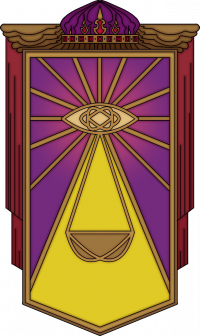 | |
| Religion | |
| Pronunciation | Yoon-yen-is-m |
| Origins | Emperor Theomar |
| Deities | |
| The Everwatcher and various other Gods and Goddesses | |
Origins
Unionism as a Religion was created in the year 5 AC when Emperor Theomar (the founding Regalian Emperor) proclaimed the Creed (the holy Scripture) as visions received from the Everwatcher. In the beginnings of the Empire, the faith was slow to spread, but through providence and divine intervention, as well as Regalia's military spread and aggressive missionary proselytizing, Unionism quickly spread from its small cult-like origins to a world-religion. It has over the years also absorbed Gods from smaller religions, and included Gods form other Religions to become a very all-inclusive cosmopolitan Religion. While most other Religions are Race specific with some caveats, Unionism is a cross-Race religion that invites all Races to join under the Everwatcher.
Schisms
Unionism has had a series of schisms in the past centuries, notably the Evintarian schism which was the result of dogmatic differences and a civil war, and the Supremoclast schism which followed a more critical and humanist conscience of the people. This resulted in the Religion splitting in three (with some smaller cults that were later re-absorbed) that engaged in some degree of religious war on each other to proclaim supremacy over the concept of the Everwatcher. It took several centuries, but in recent times, the conflict wounds healed, and the priests of all Schisms came together to re-merge the religious communities, founding the Unionist Divine, which represents the current faith and priesthood. Some Cults like the Evintarian and Guided Cult still exist, however these add optional additional Gods, rather than radically diverging from religious beliefs.
Core Beliefs
Unionism is a polytheistic Religion with one single superior being and his mortal vessel on earth, and a whole host of paired Gods who all offer specific lessons of the faith. The Religion's primary objective is world domination, that is to say, to create a globe-spanning Regalian Empire that can create eternal peace and stability, and bring about paradise by banishing war and suffering and death, and bring back all the dead from the Afterlives into an eternal paradise. Each of the God Pairs (except the Vessel) provides what the Unionists call, a Golden Lesson, which acts like a virtue, and opposes a sin in the belief of Unionism. If a person dies and their soul is judged by the Everwatcher they are found to be virtuous, they join the Everwatcher on the Great Stairway where they watch down on the living in wait for paradise to come. If they are deemed sinful, they are re-incarnated in the mortal world, so they are given another chance. The following Golden Lessons can be found in Unionism:
- Theomar and Thedmir: The Golden Lesson preaches that Unionism is good, and that spreading the faith is a virtue, and that sin is turning away from the Great Way, or outright sabotaging its intent.
- Ness and Eora: The Golden Lesson preaches that kindness and compassion are good things, and that even the most criminal seek love and affection and are deserving, while sin is to be bereft of mercy.
- Juvin and Glanzia: The Golden Lesson preaches that virtue is with the pure soul not tainted by the corrupt powers, and with knowing pure fact from wrong, while sin is spreading corruption and false information.
- Allest and Brand: The Golden Lesson preaches that loyalty to the state, the army, and fellow believers is a virtue, as is physical strength, and that sin is treason, deceptiveness without morals, and adultery.
- Elia and Leona: The Golden Lesson preaches that responsibility and protecting society is shared by everyone, no one can be excused, and that sin is to indifferent and not watching for the dangers of the world.
- Neal and Nolven: The Golden Lesson preaches that culture and art fill the soul with light, and that even in the darkness of war is beauty, and that sin is pure blind hatred without grace or beauty.
- Al-Asir and Marani: The Golden Lesson preaches that Technology brings forth great progress, and to share with society is a virtue, and that sin the creation of killing machines that automate death.
- Tanthor and Dari: The Golden Lesson preaches that even the most wretched, unwanted, and outcast of society have a role in the Great Way, and that sin is to find sadism and satisfaction in hurting the unloved.
- Mendes and Hor: The Golden Lesson preaches that wealth is there to be shared, but ultimately needed for the greatness of the faith, and that sin is to hoard wealth alone, and to steal from others.
- Sinnavei and Eirlys: The Golden Lesson preaches that even those outside the Faith can have an indispensable role to fill in paradise, and that sin is the wanton destruction of all that is alien and unknown.
- Caan and Kaldric: The Golden Lesson preaches that Magic and the Occult are a tainted burden that come with great responsibility, and that virtue can be found in good use, and sin in selfish destructiveness.
Divine Mechanics
All Religions provide 1 single Mechanic to their Believers that fits within the flair of their Religion. This Mechanic is lost if the individual stops believing in the Religion, or becomes a heretic, but can be regained. Afflicted can use this mechanic, but having the mechanic does not imply that they have blanket forgiveness from their Gods, just that there is more nuance to it than that.
- Unionist Faithful can be blessed by the gods by having a divine intervention and being cured of their Affliction or being cleansed of their Affinity through a divine event. Such a divine event should be orchestrated by the player themselves, does not necessarily require a pre-condition like "this character destroyed a Unionist Temple so the Gods intervened" or "this Character tore apart a painting of the Emperor so the Gods punished them", but can require one. This should generally only occur once per Affliction/Affinity, and is entirely up to the player's own consent over their character when and where it occurs.
Gods and Goddesses
Unionism differs from other Religions, in that it has Duo-Gods. All Duo-Gods are divine and each have divine powers in the afterlife (though some Gods may be yet living). Unionists worship all Gods equally, though they may choose specific Patron gods which they worship more. The Everwatcher acts like an overarching God of Gods, but the Everwatcher cannot directly be interacted with, so most people end up praising the Everwatcher through the Gods and Goddesses. Unionism also has the Cults further below. Cults add Gods onto the standard Pantheon, but they are not mandatory for vanilla Unionists who don't worship the Cults. It is possible to be a believer of both Cults.
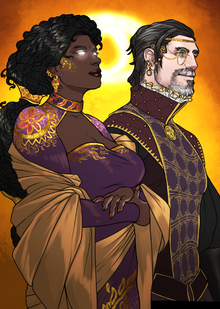
|
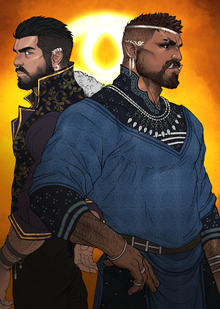
|
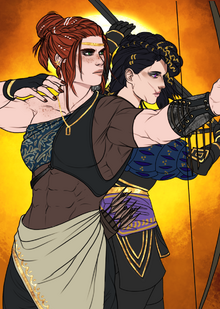
|
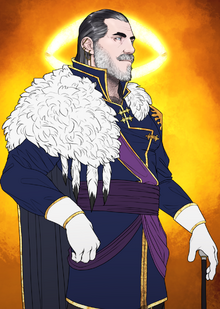
|
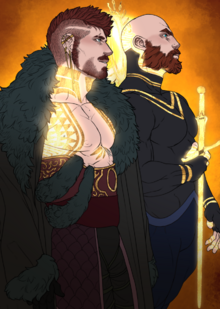
|
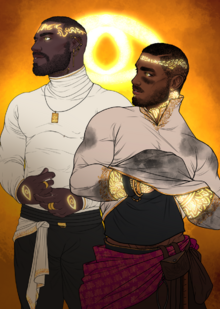
|
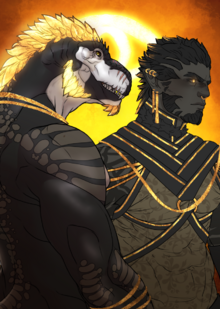
|
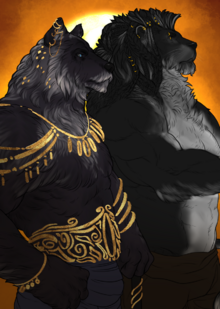
|
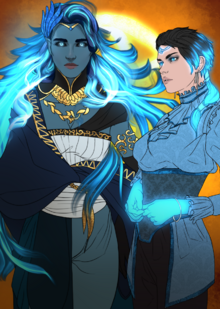
|
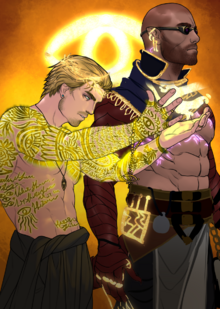
|
Cults
Cults exist in Unionism as "add-ons" for the Religion itself. While all Unionists by default worship the Gods and Goddesses listed in the Pantheon above, some Cults within Unionism worship additional gods that most of the main stream believers do not. These are holdouts from the old Schisms, that albeit while joining the main current of religious worshipers, still have some leftover of their old beliefs. Each Cult is represented by a single theological belief, and with Gods who are included by this theological belief, while all other aspects of the Religion are the same. It is possible to be a member of multiple Cults as they just add additional beliefs, but it is also possible to believe in one of the Cults, or none at all.
Evintarian Cult
The Evintarian Cult was established by the Evintarian Schisms many centuries ago when the Evintarian priests split off, and were expelled from Regalia and founded their own country in Etosil. The Evintarian Schism happened, because the Evintarian Priests thought that Trans-Dimensional Entities (such as certain Demons) could become Gods too if they shed off their sinful nature and were blessed by the Everwatcher, which the main dogmatic branch rejected. The Evintarian Priesthood voted to join the Unionist Divine, and so they became a Cult that has included several Trans-Dimensional Entities as God Pairs. Each of the Evintarian Gods requires some explanation of how they came to be accepted as Gods in the Evintarian Cult, which will be explained first, before the Gods are discussed.
Kithemon is an Exist entity from another realm that possessed an Aetosian man named Nikolaos (surname lost to time). Kithemon was verified as a God for the Evintarians, as he granted them many protections of the mind against incursions from Demons and other entities who would corrupt and usurp them and rob them of their freedom and identity. Amandaros is a Void Entity that was somehow related to the Evolist God Armas, but always dodges the subject when discussed. Amandaros possesses his host an Asha named Amon, though it is important to mention that Amandaros as an entity does not reside in a single place, but can be in many places (and hosts) at once. Amandaros is also summoned by the Mask of Amandaros which is held in Evintarian Shrines, which the faithful may use to help conceive children if they cannot themselves (see: Amandaros Godborn). Yvasi is an Ordial Entity possessing a Half-Eronidas named Girin who has proved to be of aid to the Great Way, by traveling the lands and helping the faithful realize and manifest their true self in gender, appearance, and heritage. It is not known what entity Yvasi is related to, but she did show her loyalty to mortals and the living, by aiding in the defense of the Last City of the Living, before traveling on to Aloria to aid the Unionists.
Yvasi in particular discusses many concepts of transhumanist and transgender concepts with the faithful, as she is a female-presenting spirit in a male-presenting body, and how that generally affects gender presentation to the faithful, as well as gender roles in society. Finally, Eredicos is a divine name for the Imperial Prince Frederick Kade (second son of the Emperor), who shares his body with an ancestral spirit of Betheoric I Kade. Unlike the other entities who have mostly subsumed their host, Eredicos represents both Frederick in the mortal body and Betheoric in the immortal self, and the two frequently exchange host status. Eredicos is a very recent addition as God, because Frederick only ascended to godhood when he became an Urlan in the past 3 years, and in doing so, proved to have divine god-like powers of command and venerability over even non-believers through Betheoric. The fact that an Imperial prince is technically possessed by a Primal Revenant is a very much not-so-secret at the Imperial Palace, but out of respect nobody causes an issue over it.
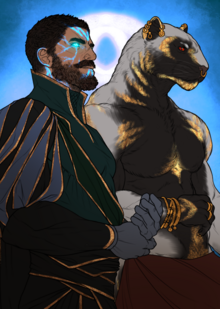
|
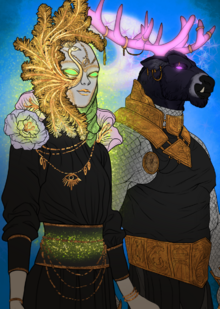
|
Guided Cult
The Guided Cult has a long and troubled history, as Dogmatic Unionists tried to violently suppress so-called religious-critical movements that challenged the clergy by asking questions instead of blindly believing everything that was fed to them. The Guided Cult inevitably agreed to re-join the Unionist Divine, as the priests of the other groupings agreed to accept their Duality-God (each God representing two) entities, while also admitting some of their more free-thinking ideas in how to interact with the priests. While prior the priests could not be questioned, with the Guided Unionist re-interpretation, Priests were actively challenged to be questioned in their preaching and faith, so that everyone would become stronger in belief. The Guided Cult still exists, because they hold on to some of the so-called Dragon Gods.
This means that while critical thinking, questioning faith, and keeping an innovative and independent mind are aspects of the Guided Cult, what is more important to them is the divinity of Dragons, that being also the separation between them and the dogmatic beliefs: that Dragons can be Gods. Dragons are all Divine, and while not all Dragons are Gods, some of them are, and they should be adhered to when they make proclamations. Some make the incorrect assumption that this means Guided Unionists believe in both Unionism and Draconism, but the Guided Unionists specifically delineate between Draconist Gods, and Unionist Gods, in that the Dragons that are Gods, are specifically not Dragons from Draconism, because they represent a different faith. That being said, Archon do exist in an in-between function, in that the Guided Cult does accept Archon as holy warriors if they worship Unionism. Each Duo-God pairing is a pair of a Dragon Soul God, and an Archon God who acts as their protector. The first Dragon God is Nicholas Kade, the Glorious Arch-Chancellor who is commonly remembered as the most competent government leader the Regalian Empire ever had, and Aarthes his Fin'ullen Archon Bodyguard. Nicholas has been dead for over a century, but Aarthes is still alive, living in Nicholas's old Estate in Anglia alone.
The second Dragon God is Morgan Kade who is commonly remembered as a highly competent, but extremely morally corrupt and cruel Arch-Chancellor, and Narsil his Snake-Marken Archon Bodyguard who was painted in Gold as he slithered through the Imperial Palace. Morgan died several decades ago, and Narsil was put to death immediately after Morgan, as he was no longer around to protect his bodyguard-pet Marken. The duality of virtuous Nicholas and sinful Morgan as Gods is that the Guided Unionists believe that Gods can also be just awful people, and be extremely selfish and capricious, but that bad qualities and ugly personalities are not reasons to write off the skills and competencies that people do have. The Guided Cult holds that Dragon-Souls (like Prince Cedromar, or his children August and Florian) would be more suitable heirs to the throne, but have agreed with their re-integration into Dogmatic Unionism to cease their opposition to Emperor Alexander's rule.
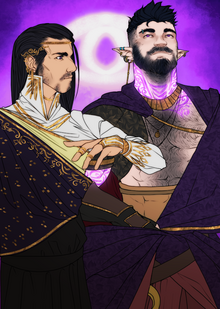
|
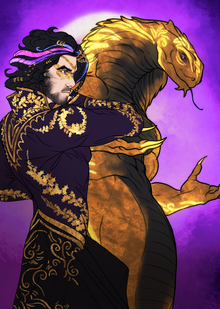
|
Armageddon Cult
The Armageddon Cult originated in the preaching of the Evintarian priest Belisarius, whose core belief was that while Paradise is certain to come at the end of the Great Way, that the traditional doctrine does not account for the non-mortal elements of the world. In essence, while believers and mortal non-believers alike could bring about Paradise, the dogma does not account for the existence of Demons, those who reject the Emperor's love, and Vampires who by nature cannot love his grace. Belisarius believed that on the Eve of Paradise, an event would occur called the Armageddon, where all the Demons, Demon worshipers, Arken, Void Gods, and other entities that wish to prevent Paradise, would unleash a holy war on Unionism and that the final test before Paradise would be winning this cataclysmic war that would touch all corners of the mortal realm. Armageddon Cultists in essence believe in an inevitable "War in Heaven", and express their belief mainly in daily "thinning the herd" of Demons and Vampires so as to reduce the overwhelming forces that the Demons will come to possess when Armageddon begins.
They are doomsday preppers, with many even entertaining that Armageddon will not come in their lifetime, but that they will contribute to a reduction of the numbers of the enemy, and preparing the Empire and their descendants for the final war by producing more weapons, and researching every edge they might gain against the Demons. The Armageddon Cult is unique in Unionism in that it acknowledges an actual canonical evil, the supreme devil as it were, and entertains the idea that there is actually a chance that the Armageddon war might be lost if too many people fall to the vices of Demon worship and consorting with the Devil. The Armageddon Cult was accepted into the faith along with the other Cults, and conformed just like the others. It is a relatively small cult, but it is immensely popular among purists and those who make it their daily employment to hunt down Demons and serve the Emperor by slaying his detractors. It should be noted that a more twisted version of the Armageddon Cult also exists. Because the "evil" Gods (perceived similarly to Guided Unionism in more of a fear-worship, or appeasement to keep them away) are still immensely powerful, some Vampires have developed a twisted version of the Armageddon Cult where they believe that when Armageddon begins, they will all rise up against the Gods of Evil, and join the righteous in the war in heaven for Paradise, and redeem themselves.
Through this belief, some of them have become pro-Regalian pro-Emperor, acting from the shadows in the benefit of the Regalian Empire, even if the Empire would have them slain at the earliest convenience. This Vampiric interpretation is obviously heretical and not supported by the Cult itself, but it is notable enough to be mentioned, and why some Vampires might worship the Armageddon Cult Gods. On a closing note, while the Armageddon Cult only has two Devil Gods, the theology allows for a much larger range of evil entities to be acknowledged as "Aspects of the Endwar", such as Void Gods, Arken, Greater Demons, and in some interpretations even Estelley Gods. The Armageddon Cult has many superstitions concerning the Endwar, and players are encouraged to experiment with catholic apocalypse visions and the circles of hell.
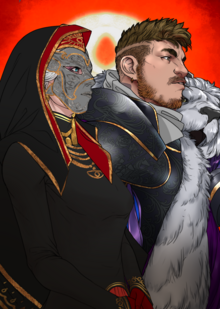
|
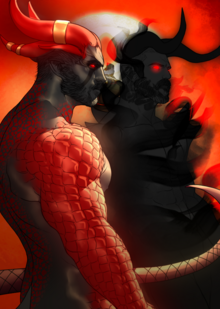
|
Priestly Activities
Unionist priests are part of the so-called Covenant College. At the very top is the Secilly Council. Originally this organization had a leader called the Supreme Reverend, however the Supreme Reverend position was abolished when the last Supreme Reverend discovered insidious corruption within the religious community, tried to expose it, and was assassinated for it. To compensate, Conclave determined that the Dogmatic community should henceforth be ruled by a Council of elder Arch-Everians. Below the Secilly Council, are the Arch-Everian, which are equivalents to Dukes in the Regalian Empire. They wield considerable power and rule over vast areas of land, subdivided into Everies. Below the Arch-Everian is the Everian, or just the average priest. Each Everian administrates an Everie, which is usually a piece of land donated to the clergy where they maintain temples, shrines, and sanctuaries, while also producing crops and tending to cattle. Everians perform all religious tasks such as confession, preaching, hearing concerns, and simply taking care of Unionist needs like a social caretaker or mental health worker. Arch-Everians on the other hand are more administrative in that they take care of the treasury, any military attached to the religious orders, and communication between the Secilly Council and the vast wide-spread Unionist elements. Formally the Emperor is the leader of the Holy Seat, which is more of a group term for the Palace and the Secilly Council grouped together, but historically Emperors have interfered very little in the day to day running of the Everies, and as such, this fact is usually ignored, the Emperor being considered a completely independent entity. This has also historically separated the Emperor from controversy among the Everians, and vice versa.
Expanded Lore
The Expanded Lore section contains additional contextual information about the Gods. While the above sections will provide enough information to get a clear picture, there are some nuances and subtext to the Gods that are not apparent on first inspection, but that may be very useful for super-pious Characters. This section will tackle each God pair in greater detail (eventually) and discuss various additional pieces of information available for the faithful.
- Silent Sisters
- Pious Brothers
- Unionism Expanded
- This section is not yet fully written, as it will come very last when all other immediate Religion update tasks are done.
Faith Syncretism
All Gods and all Religions in Lore are valid, because they physically exist in the world and constantly provide evidence to their divinity, however, Religions have boundaries to which Gods to worship and which ones not to. Faith Syncretism is an optional concept where a person who is faithful to the Religion found on this Page, includes two Gods from another Religion to expand their Pantheon and acquire additional beliefs. While this concept stands on shaky grounds when examining canon lore too closely, it is mostly motivated because Religion sometimes creates unnecessary obstacles for Roleplay Alliances or interactions. By allowing Religious figures to expand their Religious loyalty, they gain access to a wider range of people to interact with that would otherwise be closed due to Religious dogma. Syncretism has several rules applied:
- Only one Syncretism may be chosen, and this choice is permanent. The Syncretism should be recorded in the same place where Religions are mentioned on a Character Application.
- Syncretic believers do not worship all the Gods of the second faith, only the two included in the Syncretic belief, it is not possible to expand beyond that or choose other Gods.
- Syncretic beliefs do not grant access to Religious Mechanics of the secondary Religion or other bonuses acquired from Religions or Gods as mentioned on their Pages.
- Syncretic believers cannot be Priests, Godchosen, or any other type of Religious figure as described on the Pages. They must be singularly loyal to their own Religion.
- Syncretic believers are not discriminated against by believers of the secondary Faith. They can however be criticized by their primary faith for their choice of Syncretism.
Syncretism Variants
- Fornoss Syncretisms
- Love for Life Syncretism: Leif and Eikki form the basis of the Love for Life Syncretism, which supplements the Unionist Pantheon with the Love and Affection God Leif, and the Feasting and Joy God Eikki. This Syncretic theme incorporates a love for life and others, while bringing more nature-elemental and shamanistic aesthetics to Unionism.
- Chained Guilt Syncretism: Bard and Hrymrök form the basis of the Chained Guilt Syncretism, which supplements the Unionist Pantheon with Retribution and Judgement God Bard, and the Freedom and Liberty Goddess Hrymrök. This Syncretic theme incorporates a more violent and aggressive hostility towards the enemies of Unionism, and taking the initiative on destroying Unionism's rivals, while bringing more while bringing more nature-elemental and shamanistic aesthetics to Unionism.
- Draconism Syncretisms
- Imperial Core Syncretism: Regulus and Gaia form the basis of the Imperial Core Syncretism, which supplements the Unionist Pantheon with the Rulership and Time God Regulus, and the Preservation and Redemption God Gaia. This Syncretism theme incorporates Dragons as divine beings created by the Everwatcher to preserve Unionism, and identify the so-called Imperial Dragons as Regalian-native Gods, while bringing respect and preservation of old Draconic Sites and Radicals of the Dragons along with it.
- The Black Flame Syncretism: Caius and Umbra form the basis of the Black Flame Syncretism, which supplements the Unionist Pantheon with the Violence and Battle God Caius, and the Death and Decay dragon Umbra. This Syncretism draws direct lines from the Immortal War and the fight of Dragons against the Occult, and the Unionist Purist stance on Magic usage, identifying the Dragons as some type of Everwatcher ordained holy protector, and bringing with it the use of Leytech to fight the Occult.
- Estelley Syncretisms
- The Fae Queens Syncretism: Vyrë and Mana form the basis of the Fae Queens Syncretism, which supplements the Unionist Pantheon with the Commanding Ocean Goddess Vyrë and the Compassionate Nature Goddess Mana. This Syncretism poses that Unionism lacks an explanation for the natural realm, a Nature Goddess to praise for the bounty of the forests, and a Sea Goddess to worship for safe passage on the open seas. This Syncretism also ports pro-Magic and Elven Mysticism into Unionism.
- The Moon Gazer Syncretism: Leyon and Melca form the basis of the Moon Gazer Syncretism, which supplements the Unionist Pantheon with the Protection and Benevolence God Leyon, and the Foresight and Mysteries Goddess Melca. This Syncretism poses that Unionism focuses too strongly on the mechanical industrial world, failing to see the mystical and often Magical reality that exists also, and assumes too much from a Mundane point of view, thus expanding horizons to truly connect with Mysticism.
- Baskarr Syncretisms
- The Golden Hour Syncretism: Tjafar and Akhet form the basis of the Golden Hour Syncretism, which supplements the Unionist Pantheon with the Insight and Rulership God Tjafar, and the Unaccountable Reclaimer God Akhet. The Golden Hour Syncretism incorporates the Asha as brother-folk to the Unionists, in that much of their Allorn-oppressed history is aligned, and their long term goals also align. Golden Hour Syncretism believers acknowledge Asha and Ailor as the same people.
- The Relentless Vengeance Syncretism: Khannar and Wadj form the basis of the Relentless Vengeance Syncretism, which supplements the Unionist Pantheon with the Hateful Vengeance God Khannar, and the Intrigue and Deceit God Wadj. This Syncretism takes a lesson from the Revenge Asha: Unionism and the Regalian Empire move too slowly to punish evil, and all forces should be more aggressively forced away from inaction and apathy, and into Violence against the Allorn.
- Evolism Syncretisms do not exist in Unionism, due to their extreme opposition to one another.
Trivia
- Unionism used to be mandatory for nobility somewhere during the second century after Cataclysm, though this Holy Law was removed when the war against the Skagger Horde ceased, and the Empire benefited more from including non-Unionists into the peerage. An exception had always been made for the Solvaan nobles in Solleria however, called the Confessions of Melennar.
- Sectarian violence largely came to an end at the turn into the fourth century as the last attacks on Vultragon Unionist by state forces ceased, and an uneasy truce was signed between the Schism religious communities. They still do not see eye-to-eye, and the different Schismatic groups still prod at each other, but instead of murdering each other over sectarian differences, they mostly fight with words nowadays, a legacy of the Kleine Rechnung, the document that called for the truce.
- Despite Eirlys's absorption into Unionism, the Breizh still maintained a high level of cultural autonomy, some even clinging to old beliefs. As such, even when Magic became illegal in the Empire, the Breizh Aelrrigan Order continued to find and train Mages safely in their sanctuaries while the rest of the Empire turned to brutal oppression (and the Magic part of Eirlys was suppressed from dogma). Eirlys' faithful among the Aelrrigan Order are commonly cited as the reason why Magic acceptance eventually returned, and Eirlys' magical nature in theological teachings was returned.
| ||||||||||
| Accreditation | |||||||
|---|---|---|---|---|---|---|---|
|
| ||||||
